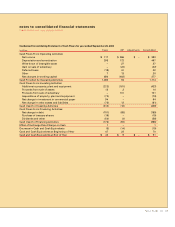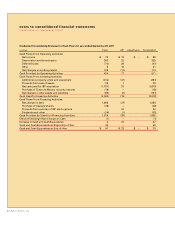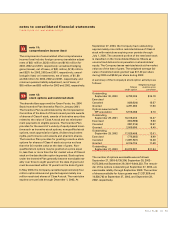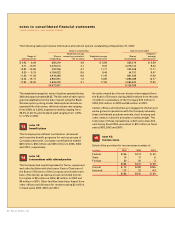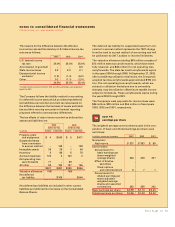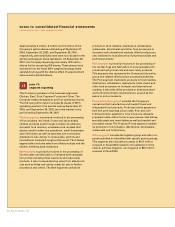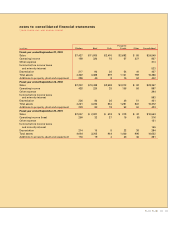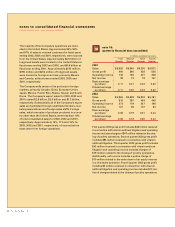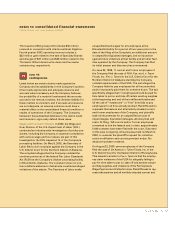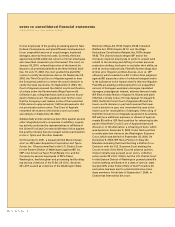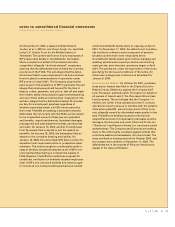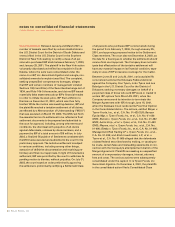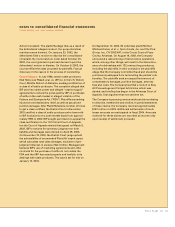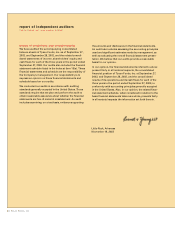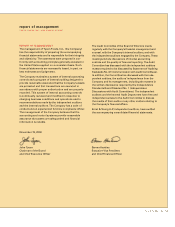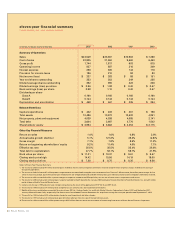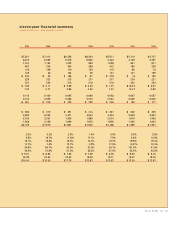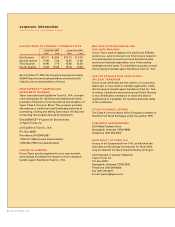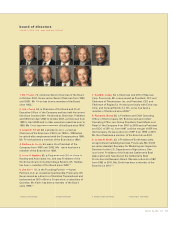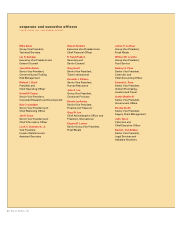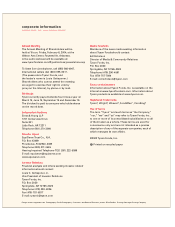Tyson Foods 2003 Annual Report Download - page 61
Download and view the complete annual report
Please find page 61 of the 2003 Tyson Foods annual report below. You can navigate through the pages in the report by either clicking on the pages listed below, or by using the keyword search tool below to find specific information within the annual report.
Tyson Foods, Inc. 59
notes to consolidated financial statements
TYSON FOODS, INC. 2003 ANNUAL REPORT
On November 21, 2002, a lawsuit entitled Emily D.
Jordan, et al. v. IBP, Inc. and Tyson Foods, Inc., was filed
in the U.S. District Court for the Middle District of
Tennessee. Ten current and former hourly employees of
IBP’s case-ready facility in Goodlettsville, Tennessee,
filed a complaint on behalf of themselves and other
unspecified, allegedly “similarly situated” employees,
claiming that the defendants have violated the overtime
provisions of the FLSA. The suit alleges that the defen-
dants have failed to pay employees for all hours worked
from the plant’s commencement of operations under
IBP’s control in April 2001. The Company acquired the
plant as part of its acquisition of IBP. In particular, the suit
alleges that employees should be paid for the time it
takes to collect, assemble, and put on, take off and wash
their health, safety and production gear at the beginning
and end of their shifts and during their meal period. The
suit also alleges that the defendants deduct 30 minutes
per day from employees’ paycheck regardless of
whether employees obtain a full 30-minute period for
their meal. Plaintiffs are seeking a declaration that the
defendants did not comply with the FLSA, and an award
for an unspecified amount of back pay compensation
and benefits, unpaid entitlements, liquidated damages,
prejudgment and post-judgment interest, attorney fees
and costs. On January 10, 2003, another 31 employees
from Tennessee filed consents to join the lawsuit as
plaintiffs. On January 15, 2003, the defendants filed an
answer to the complaint denying any liability. On
January 14, 2003, the named plaintiffs filed a motion for
expedited court-supervised notice to prospective class
members. The motion sought to conditionally certify a
class of similarly situated employees at all of IBP’s non-
unionized facilities that have not been the subject of
FLSA litigation. Plaintiffs then withdrew a request for
conditional certification of similarly situated employees
at all of IBP’s non-unionized facilities and rather sought
to include all non-exempt employees that have worked
at the Goodlettsville facility since its opening on April 1,
2001. On November 17, 2003, the district court condition-
ally certified a collective action composed of similarly
situated current and former employees at the
Goodlettsville facility based upon clothes changing and
washing activities and unpaid production work during
meal periods, since the plant operations began in April
2001. The parties are, under the supervision of the court,
specifying the terms and conditions of the notice. An
initial case management conference is scheduled for
January 8, 2004.
Environmental Matters On October 23, 2001, a putative
class action lawsuit was filed in the District Court for
Mayes County, Oklahoma, against the Company by R.
Lynn Thompson and Deborah S. Thompson on behalf of
all owners of Grand Lake O’ the Cherokee’s littoral (lake
front) property. The suit alleges that the Company “or
entities over which it has operational control” conduct
operations in such a way as to interfere with the putative
class action plaintiffs’ use and enjoyment of their prop-
erty, allegedly caused by diminished water quality in the
lake. Plaintiffs are seeking injunctive relief and an
unspecified amount of compensatory damages, punitive
damages, attorney fees and costs. Simmons Foods, Inc.
(“Simmons”) and Peterson Farms, Inc. have been joined
as defendants. The Company and Simmons are seeking
leave to file a third party complaint against entities that
contribute wastes and wastewater into Grand Lake. The
class certification hearing was held in October 2003, and
two classes were certified on December 11, 2003. The
defendants are in the process of filing an interlocutory
appeal of the class certification.


